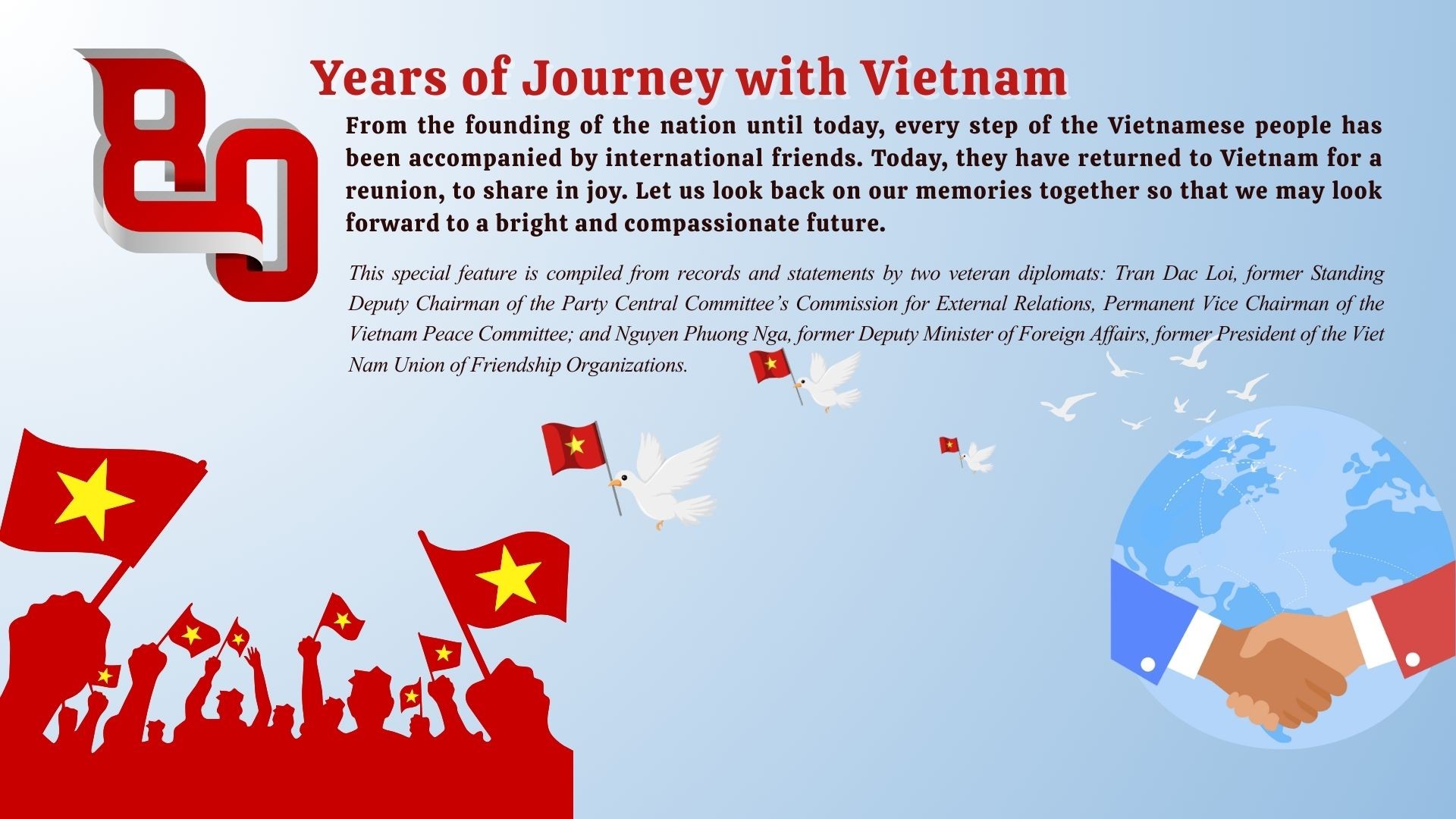 |
Article 1:Affection of International Friends |
We must always remember that over the past 80 years, friends from around the world have devoted their blood, sweat, and tears to the cause of defending and building Vietnam. |
 |
|
The struggle for national liberation by the Vietnamese people was the focal point of solidarity for peace- and justice-loving movements around the world in the 20th century. During the resistance war against the French, the peoples of socialist countries, especially the Soviet Union and China, gave our people strong material and spiritual support. Many popular movements opposing the war and expressing solidarity with Vietnam took place in Europe, Asia, and Africa. In French colonies such as Algeria, Tunisia, and Madagascar, movements emerged against conscription to the Indochina battlefield and against the shipment of weapons bound for Vietnam. Progressive international democratic organizations carried out numerous rallies and campaigns to demonstrate solidarity with Vietnam. The congresses of the World Peace Council all adopted resolutions in support of Vietnam. At its 1951 Congress in Vienna, Austria, the Council passed a resolution calling for “Peace in Vietnam! Withdrawal of foreign troops from Vietnam!” In October 1953, the 3rd Congress of the World Federation of Trade Unions, also held in Vienna, declared December 19, 1953, as the “Day of Solidarity with the Heroic Vietnamese People and the Demand to End the War of Aggression in Vietnam.” Notably, in France, a powerful anti-war movement broke out with exemplary figures such as Henri Martin, Raymonde Dien, and Madeleine Riffaud, who defied repression and imprisonment. Numerous strikes occurred, disrupting the production and shipment of weapons and war materiel from France to Indochina. Demonstrations demanded that the French government engage in genuine negotiations and sign an armistice in Indochina. Alongside the decisive role of the victory at Dien Bien Phu, the political pressure of the French people’s Front opposing the war played a crucial part in forcing the French government to come to the negotiating table and sign the 1954 Geneva Agreements, which ended the war and restored peace in Indochina. During the resistance war against the United States, the world people’s front of solidarity with the Vietnamese people grew to an unprecedented scale in history. Mass organizations, friendship associations, and popular movements in the Soviet Union, China, Cuba, and other socialist countries organized thousands of rallies, marches, exhibitions, and fundraising campaigns, attracting millions of participants who expressed solidarity and support for the Vietnamese people. Hundreds of solidarity organizations with Vietnam were established across Europe, Asia, the Americas, and Africa. |
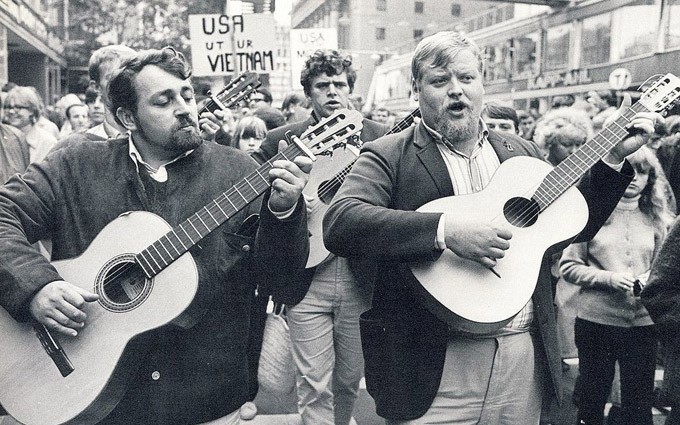 Artists Cornelis Vreeswijk, Fred Kerström, and Gösta Cervin (from left to right) at an anti-Vietnam war march in Stockholm, Sweden, 1965. Artists Cornelis Vreeswijk, Fred Kerström, and Gösta Cervin (from left to right) at an anti-Vietnam war march in Stockholm, Sweden, 1965. |
|
The slogan “Your name, my name, our name, Vietnam! Vietnam!” became the unified voice in mass demonstrations involving millions of people in India. In Sweden, broad and vigorous popular movements in support and solidarity with Vietnam spurred the government to establish diplomatic relations with the Democratic Republic of Vietnam even while the war was ongoing (January 1969). Prime Minister Olof Palme, together with Madam Nguyen Thi Binh, led tens of thousands of people in a march in the capital, Stockholm, gathering signatures in support of the Vietnamese people’s resistance against America. Many international democratic and progressive organizations, such as the World Peace Council, the World Federation of Trade Unions, the World Federation of Democratic Youth, the International Union of Students, and the Afro-Asian-Latin American People’s Solidarity Organization, launched campaigns and activities in solidarity with the Vietnamese people. The Tricontinental Conference held in Cuba (January 1968), attended by delegates from 82 countries and many representatives of national liberation movements from three continents, adopted a resolution affirming that “defending the revolutionary cause of the Vietnamese people has become a central task in the revolutionary strategy of the peoples of Asia, Africa, and Latin America.” The conference also established a Tricontinental Committee for Solidarity with the Vietnamese People against US aggression. |
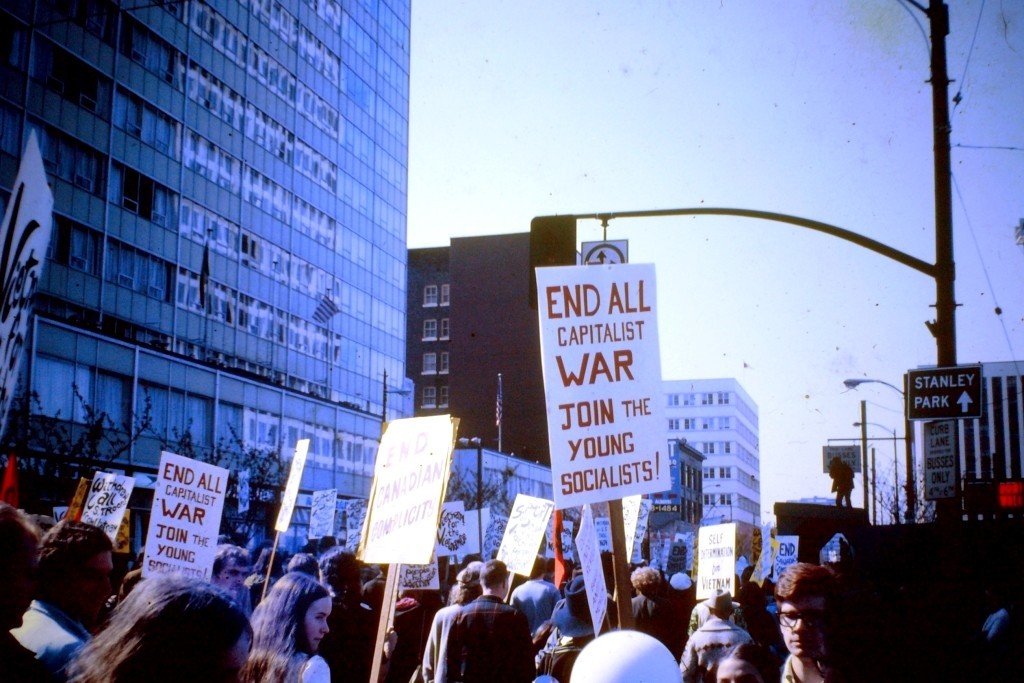 Anti-Vietnam war demonstration in Vancouver, Canada, 1968. Anti-Vietnam war demonstration in Vancouver, Canada, 1968. |
|
Also during that time, the Bertrand Russell International War Crimes Tribunal (founded in November 1966) convened two sessions, in Stockholm (May 1967) and Copenhagen (November 1967), which condemned US imperialism for committing war crimes, crimes of aggression, and crimes of genocide in Vietnam. Notably, the anti-war movement erupted strongly within the US, with the active participation of people from all walks of American society, creating what was called “a war within America.” Tens of thousands took part in seminars and marches; half a million young Americans refused the draft, and millions joined protests against the unjust war in Vietnam. Among them were prominent figures such as Reverend Martin Luther King Jr., actress Jane Fonda, political activist Angela Davis, social activist Cora Weiss, and Merle Ratner. Eight Americans, led by Norman Morrison, even set themselves on fire in protest against the US war in Vietnam. These anti-war movements generated considerable political pressure, limiting the US government’s ability to prolong the war and contributing to the decision to enter negotiations to withdraw American troops from Vietnam. |
 |
| After national reunification, international friends, progressive forces, and peace-loving people worldwide once again joined hands to help Vietnam overcome the consequences of war, break through the blockade and embargo, and support socio-economic development. Numerous peace and humanitarian activities, such as Operation Smile surgeries, mine clearance, assistance for victims of Agent Orange, peace walks, and visits by veterans, helped heal the wounds of war, enhance mutual understanding, and promote the normalization of relations between Vietnam and its key partners, turning former adversaries into partners. |
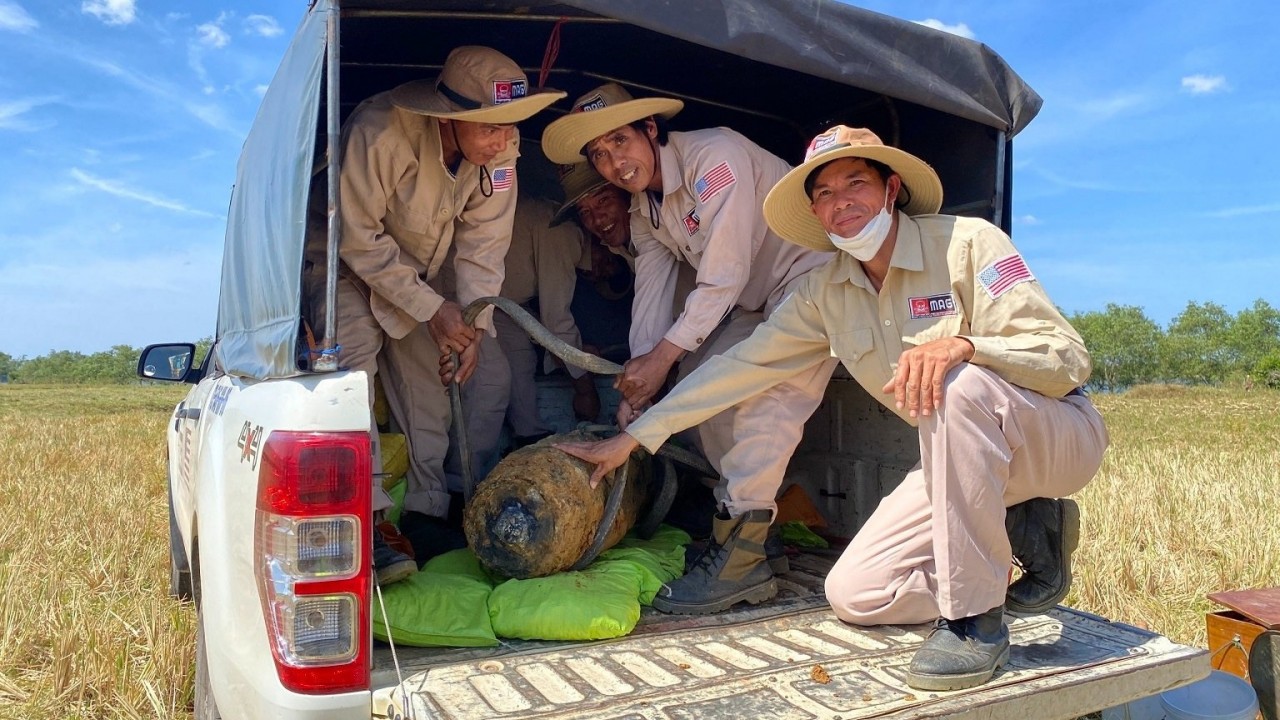 The Mines Advisory Group (MAG, United Kingdom), with support from the US Department of State, carries out mine clearance operations in Quang Tri Province. The Mines Advisory Group (MAG, United Kingdom), with support from the US Department of State, carries out mine clearance operations in Quang Tri Province. |
|
During the period of Doi Moi and international integration, international support continued in various forms. Foreign non-governmental aid (non-refundable) has been implemented in all provinces and cities, with disbursements amounting to over USD 5 billion from 2003 to 2020, and currently averaging more than USD 200 million annually. Many individuals who had once taken part in the anti-war movement later maintained close ties with Vietnam. Merle Ratner, together with her husband, Professor Ngo Thanh Nhan, campaigned for the normalization of Vietnam-US relations, sought justice for Agent Orange victims, and promoted Vietnamese culture and traditional music among the younger generation in the Vietnamese-American community. Jerilyn Brusseau (PeaceTrees Vietnam), Chuck Searcy (Project RENEW), along with many American veterans and families of US soldiers who died or are missing in the war, initiated and participated in humanitarian projects. They contributed to mine clearance, support for Agent Orange victims, the construction of schools, and English teaching, overcoming the burdens of the past to heal deep emotional wounds and foster bonds between the peoples of the two countries. |
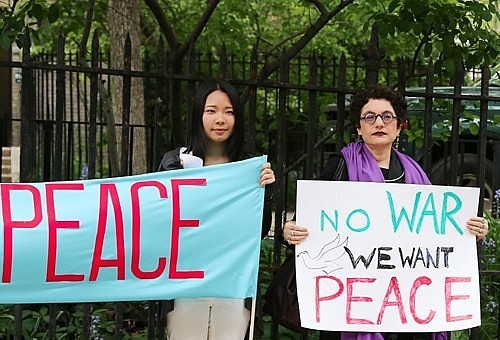 Merle Ratner (right) at an event in support of peace for Vietnam. Merle Ratner (right) at an event in support of peace for Vietnam. |
|
Another remarkable story is that of Aline Rebeaud (Vietnamese name: Hoang Nu Ngoc Tim), who came from Switzerland to visit Vietnam at a young age and decided to stay. For more than 30 years, she has devoted herself to building the “Maison Chance,” a home and refuge for disadvantaged children. During the COVID-19 pandemic, 57 foreign NGOs carried out 123 aid initiatives, including training, communications, medical supplies and equipment, essential goods, and cash support, worth over USD 10.6 million, while also signing cooperation agreements and pledging further support for Vietnam, particularly in post-pandemic recovery. In 2024, nearly 100 foreign NGOs responded to the call of the Viet Nam Union of Friendship Organizations, committing to and providing emergency relief worth around VND 230 billion to address the consequences of Typhoon Yagi. Since early 2025, foreign NGOs have actively responded to the Prime Minister’s call to “eradicate makeshift and dilapidated housing” and have pledged to support the construction of about 1,600 homes. |
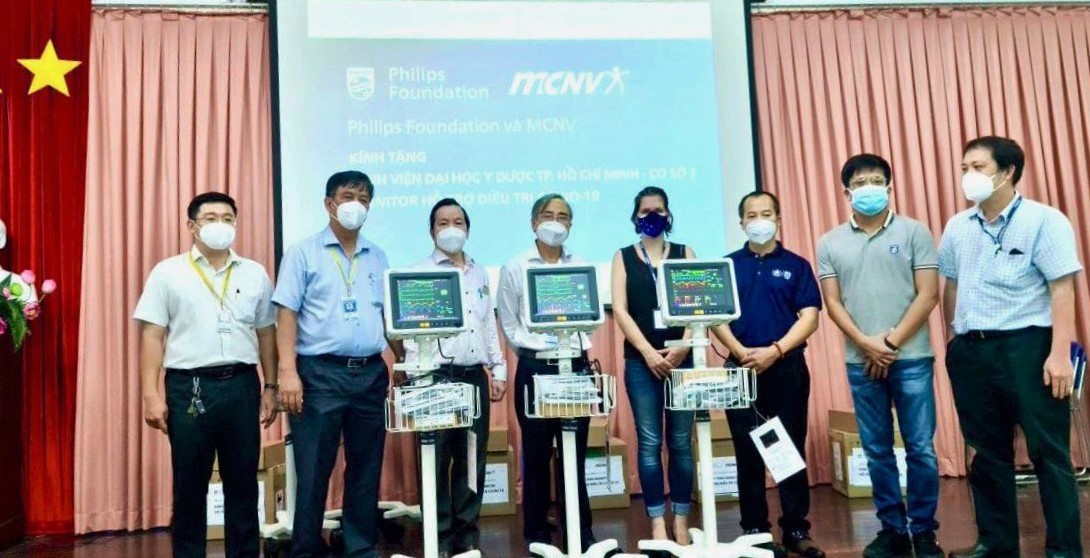 In August 2021, the Medical Committee Netherlands-Vietnam (MCNV) donated 50 patient monitors to 13 hospitals and medical centers in Vietnam. In August 2021, the Medical Committee Netherlands-Vietnam (MCNV) donated 50 patient monitors to 13 hospitals and medical centers in Vietnam. |
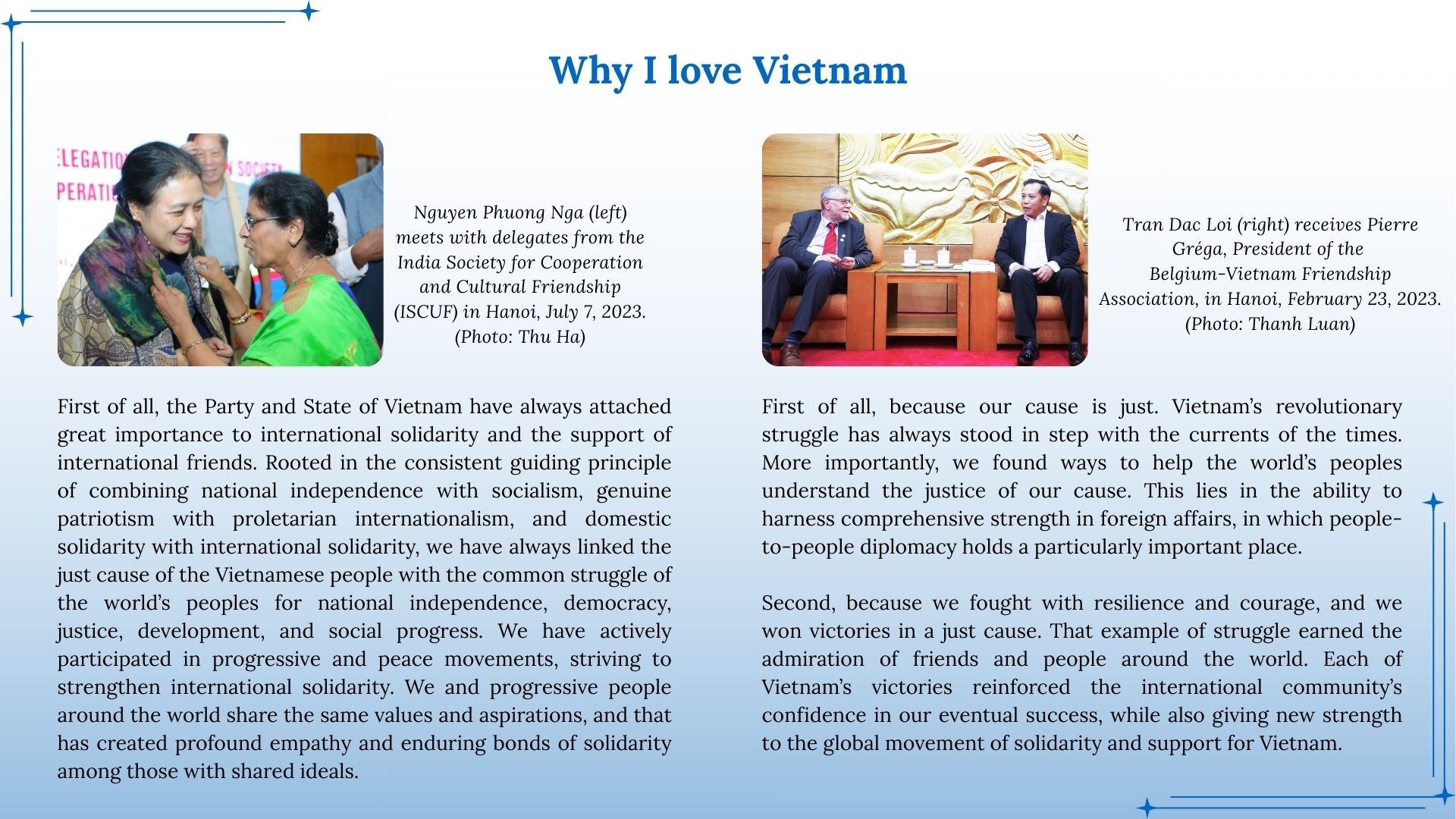 |
|
VietnamTimes Writers |